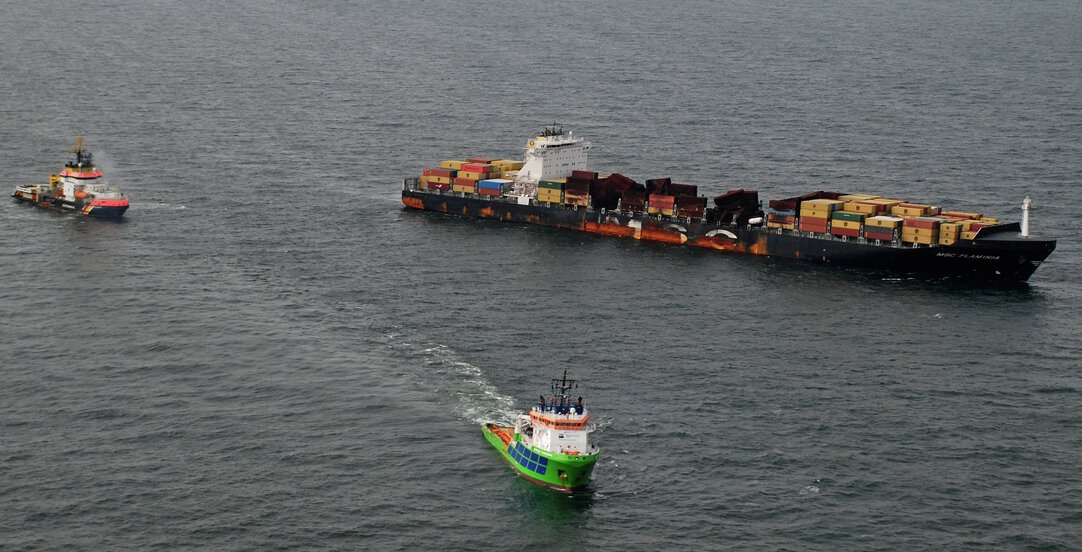Limitation of liability in light of the MSC Flaminia (No. 2) appeal decision.

The Court of Appeal in London has given further guidance on charterers’ ability to limit liability following the High Court decision in the MSC Flaminia (No. 2) reported in our December 2022 edition, giving some important clarification to the types of limitation claims charterers can make.
Reading time 6 minutes
The English Court of Appeal has recently decided an appeal and cross appeal of the High Court decision in the MSC Flaminia (No. 2) and provided further clarification of the types of claims for which charterers can limit their liability under the 1976 Convention on Limitation of Liability for Maritime Claims, as amended by the 1996 Protocol (“LLMC”).
Facts
The facts are as set out in the report on the High Court decision in our December 2022 edition. To recap, on 14 July 2012 the “MSC Flaminia” suffered a cargo explosion in the mid-Atlantic while en route to Antwerp. Salvors extinguished the fire, leaving about 30,000mt of firefighting water contaminated with dangerous and toxic residues in the vessel’s holds. While the vessel was damaged, it was repairable, but this first required the cargo, burnt waste and firefighting water to be discharged. The vessel was towed to the port of refuge, Wilhelmshaven, through the English Channel. The cargo was then discharged, along with most of the firefighting water. However, owners then organised for the discharge of the burnt waste and remaining firefighting water in Romania and Denmark, after which the vessel returned to Romania for repairs. The total cost to owners for these operations was about €115,935,000.
Owners were awarded approximately USD 200m as damages (which included the costs of cargo and fire-fighting water removal) in arbitration against charterers, who then brought a limitation action in the High Court seeking to limit their liability for owners’ claims to around GBP 28 million.
At first instance, the High Court held that charterers could not limit the owners’ claims because, following the CMA Djakarta ([2004] EWCA Civ 114), a charterer cannot limit in respect of a liability to the owner for the loss of or damage to the ship itself, since loss or damage to the ship itself is not within the scope of Article 2.1(a) of the LLMC. The Judge in the MSC Flaminia case found that the losses for which charterers sought to limit were in fact the necessary costs of the claim to repair the ship, i.e. that the removal of the cargo and fire-fighting water was a necessary part of repairing the damage to the ship and therefore not limitable. In so doing, the Judge rejected charterers’ attempts to limit liability on the basis that the losses claimed were consequential losses resulting from damage to property (the cargo) within the scope of Article 2.1(a) of the LLMC, or claims for cargo discharge and treatment which constituted the removal or destruction or rendering harmless of the cargo within the scope of Article 2.1(e), or claims for payments to public authorities that constituted measures taken to avert or minimise loss (to cargo, by aiding its voyage to Wilhelmshaven) under Article 2.1(f).
Owners argued in the High Court that limitation under Article 2.1 is only possible for losses originally suffered by a party who was not a “shipowner”, as defined in LLMC (which includes both owner and charterer), i.e. for genuine third party claims, rather than for claims as between owners and charterers. However, the High Court considered this argument was too wide, for example by not allowing limitation in respect of damage to cargo or bunkers owned by charterers.
In any event, the Court concluded that the claims which charterers sought to limit were not limitable, as they were in fact the necessary costs of repairing the damage to the ship, for which limitation by a charterer against an owner is not available.
Charterers appealed this decision on four grounds:
- the Judge was wrong to hold that claims between owner and charterer for the cost of removing cargo do not fall within Article 2.1(e)
- the Judge was wrong that claims could only be limited under Article 2.1(f) if the measures taken were solely in order to avert or minimise loss for which the person liable may limit his liability in accordance with the LLMC.
- the Judge was wrong to say that charterers’ liability was a single claim by owners in respect of damage to the ship. Instead, one should look at the individual elements of the claim.
- the Judge was wrong to hold that none of owners’ claims were for consequential loss resulting from loss of or damage to property occurring on board the ship for the purpose of Article 2.1(a).
Meanwhile, owners served a Respondent’s Notice, in which they advanced a slightly narrower formulation than the case they had run in the High Court (where they argued that limitation is only available as against third party claims, originating from outside the shipowner class). They said that “a charterer is only entitled to limit in respect of claims originating with an “outsider” and is not entitled to limit in respect of claims for losses originally suffered by the owner itself.”
The decision
The Court of Appeal agreed with owners’ Respondent’s Notice, holding that all the claims originated with owners, rather than a third party, and therefore could not be limited. Males LJ said:
“When a claim falling within Article 2 is made by an owner against a charterer, the charterer’s right to limit does not depend upon the capacity in which the charterer was acting so as to give rise to the claim, but simply on whether the owner is claiming for a loss which it has suffered itself (no right for charterer to limit) or to pass on liability for a claim made against the owner by a third party (charterer entitled to limit).”
That conclusion was therefore a complete answer to all of charterers’ claims to limit in this case and therefore the Court did not need to consider charterers’ grounds of appeal.
But it did so nonetheless and Males LJ said that “It is open to [charterers] to argue that the various losses which [owners] seek to recover fall within one or more of the paragraphs of Article 2.1 and are therefore subject to limitation” and the Court then went on to suggest that the costs of removing and decontaminating the cargo would fall within Article 2.1(e).
As regards the High Court’s single claim finding, the Court of Appeal considered that whilst there might be a claim for a single breach of charter, namely shipping a dangerous cargo, the types of loss recoverable could be various, so it was necessary to check each section of Article 2.1 in respect of the type of loss claimed.
However, this did not change the position that the Court of Appeal had already found that charterers could not limit for claims made by owners for losses suffered themselves.
Comment
The Court of Appeal’s rejection of the single claim argument and clarification of the scope of Articles 2.1(e) and (f) will be welcome news for charterers, but its expression of the insider/outsider requirement for limitable claims may need further elucidation and we understand that permission to appeal to the Supreme Court has been sought.
The Court of Appeal appears to have reached its conclusion on the basis of what it considered to be the purpose of the LLMC and common sense, in that its conclusion means that one avoids the slightly odd result that an owner’s claim against a charterer can be paid out of the very limitation fund set up by the owner, thereby prejudicing third party claimants against the fund.
However, on the other hand, the Court of Appeal decision implies words into the LLMC that are not there and overrides the plain meaning of, for example, Article 2.1(e) that claims in respect of the removal, destruction or the rendering harmless of cargo are limitable absolutely.


